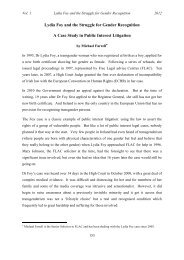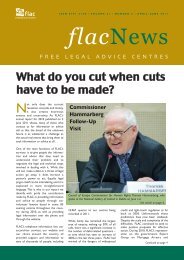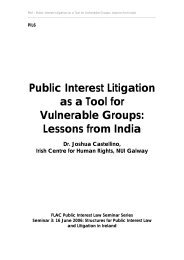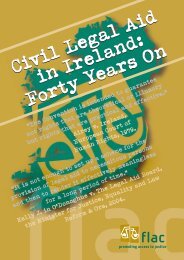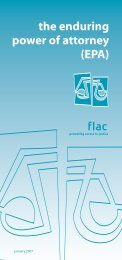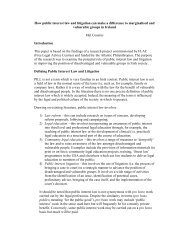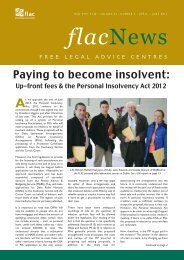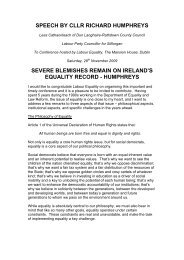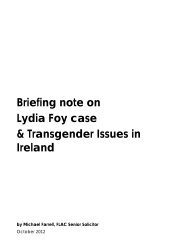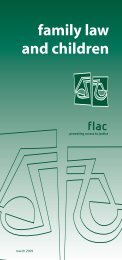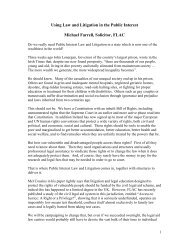Yes but, where is, what if? - FLAC
Yes but, where is, what if? - FLAC
Yes but, where is, what if? - FLAC
- No tags were found...
Create successful ePaper yourself
Turn your PDF publications into a flip-book with our unique Google optimized e-Paper software.
Comments on the Legal Services Bill26 Nov 2011________________________________________________________________________be frustrated with the situation in which they find themselves, it <strong>is</strong> also quite true that a lotof people who contact <strong>FLAC</strong> don’t want to make a complaint. Instead, they just needinformation as to how the system works. They would like an idea of whether the length oftime that their case <strong>is</strong> taking <strong>is</strong> excessive, or whether a fee <strong>is</strong> likely to be a real<strong>is</strong>tic one.People are likely to trust a system which <strong>is</strong> independent of the legal system more. They willnot feel – as many now do – that the system <strong>is</strong> weighted in favour of the lawyer or that thehearing process must be a biased one. I stress again that th<strong>is</strong> <strong>is</strong> not an objective finding thatthe system <strong>is</strong> unfair. It <strong>is</strong> the perception of many people that I relate. Therefore, as thecurrent system stands, justice <strong>is</strong> not seen to be done.However, in d<strong>is</strong>mantling that system which <strong>is</strong> too often perceived as dependent, thereplacement must not suffer from the same fatal flaw.Under the Bill, the complaints and d<strong>is</strong>ciplinary system will be a substantial part of the workof the new Legal Services Regulatory Authority. The current structure of s.8 of the Bill has aregulatory authority which will be appointed by the Government. Four nominees are tocome from the legal professional bodies (2 from the Law Society, 2 from the Bar Council) <strong>but</strong>are appointed by government and the other 7 are to be appointed by the governmentdirectly. The authority members would have a 4 year term, and would then be eligible forre-appointment – by Government. Members could be removed <strong>if</strong> ‘in the opinion’ ofgovernment, they had a sign<strong>if</strong>icant ‘conflict of interest’ or the member’s removal ‘appearedto be necessary’.I read both Dr. Carol Coulter’s recent analys<strong>is</strong> <strong>where</strong> she concluded that the proposed newsystem lacks independence and Min<strong>is</strong>ter Shatter’s defence in last Monday’s Ir<strong>is</strong>h Times<strong>where</strong> he asserts the many ways in which independence <strong>is</strong> built in to the proposedAuthority. However, that genuine defence will undoubtedly be perceived in much the sameway that those who operate the current system are often perceived as making a special casefor their own system. The proposed new Authority remains rooted in and composed by thegovernment of the day in the same way that the current system remains rooted in theprofessional bodies. The proposed structure therefore will be seen to be to be as tainted bythe perception of bias as that which went before.5



